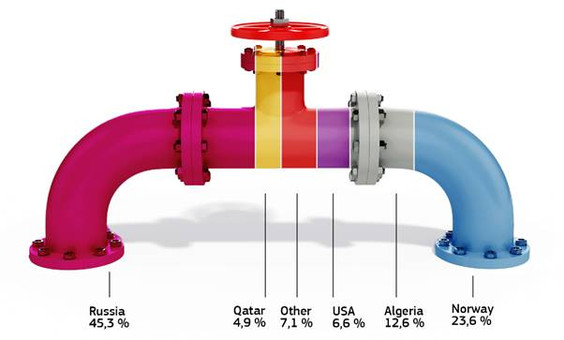Written by Anita Derjanecz, Managing Director of REHVA
The tragic events of the past weeks have drastically changed the course of Europe’s history and the global geopolitical order. The new geopolitical and energy market reality requires Europe to increase its energy independence from Russian fossil fuels and immensely accelerate the clean energy transition by doubling down on the goals of the “Fit for 55” package, which is set to reduce the EU's total gas consumption by 30% by 2030. This equals 100 billion cubic meters (bcm) of gas no longer needed.
As reaction to the Russian invasion of Ukraine the European Commission (EC) presented within 2 weeks the REPowerEU Communication, defining measures to gradually remove 155 bcm of fossil gas use in Europe, the equivalent of the volume imported from Russia in 2021. According to the EC, two thirds of this could be achieved within a year already. To break our dependency on Russian fossil fuels, Member States (MS) must speed up the change of their energy mix, which should be reflected in the functioning of the electricity market. The plan outlines a range of actions to achieve this, translating every measure into bcb of gas that can be saved at EU level.
What does the REPowerEU plan mean for the building sector?
Most importantly, a massive roll-out of heat pumps, solar, and wind energy systems.
The plan aims to double the annual pace of heat pump deployment, reaching 10 million additional heat pumps installed in the next five years compared to the business-as-usual scenario. For every 10 million heat pumps installed, the EU could save 12 bcm gas, adding up to a total 35bcm by 2030.
Boosting the deployment of heat pumps needs rapid upscaling of the entire supply chain accompanied by other measures to increase high quality building energy renovation and district heating system modernisation. This requires ambitious national implementation of the Renovation Wave strategy, and bold action and courage from national governments. For instance, the recast EPBD currently negotiated between Member States (MS) and the EC proposes banning public incentives for fossil fuel boilers from 2027. The European Environmental Bureau, the most important citizen based environmental NGO, now advocates now to go further and completely ban gas boilers from 2025.
“Fit for 55” aims already at tripling photovoltaic and wind capacities in the EU by 2030, which would decrease gas consumption by 170bcm annually. To double down on this, a new objective is to install rooftop solar PV systems by up to 15TWh this year alone, saving additional 2.5 bcm of gas. By June, the Commission will present a solar strategy, including a European Solar Rooftops Initiative with measures to accelerate roll-out and ensure that the public can fully reap the benefits of rooftop solar energy.
The Commission will also help to develop the value chain for heat pumps, solar and wind energy. Particular attention will be paid to the training and upskilling of workforce. We need a massive and fast increase of skilled installers and technicians to deploy these technologies and make the transformation happen.
Of course, the Commission’s plan can’t fly without strong support of EU Member States. The EC is keen to put more flesh on the bone of the REPowerEU plan in cooperation with MS by this summer. We’ll see if national governments will be partner in this.
No doubt that Europe must rapidly phase out Russian gas imports and reduce its reliance on fossil fuels in general to protect against volatile prices, secure supply and above all, to mitigate the climate crisis and protect the planet.
The Swedish translation of this post was published in the Energi & Miljo journal in May 2022.
Picture credits: European Commission



